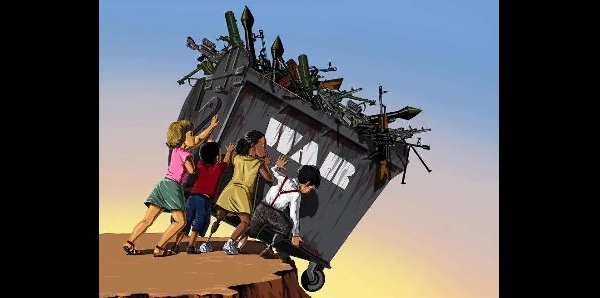The vast majority take a default position in defense of war.
I find this bizarre.
The other day, I posted this cartoon depicting a group of people dumping a cart full of weapons labeled “war” off a cliff on Facebook. The caption read, “How to make the world a better place.”

Apparently, this constitutes a controversial idea.
Why?
Objectively speaking, the world would be a better place without war.
Wouldn’t it? I mean, is this even debatable? And yet memes like this literally make people angry.
Again, why?
Now, if I were to post a cartoon asserting that the world would be a better place without murder, or rape, or robbery, or racial intolerance, it would get hundreds of “likes.” If I posted a meme advocating the abolition of hunger, or disease, everybody would agree and call me a great humanitarian.
And yet, the exact same message about war elicits negative comments and charges that I’m “an idealist.”
Certainly, imagining a world without war is idealist. I don’t deny that. But so is imagining a world without hunger, or rape, or murder, or racial discord, or any number of things we all endeavor to eliminate from the planet. Generally, humankind strives toward ideals. It doesn’t reject them.
So, why do people defend war? And worse, why do they ridicule those who take any strong position against it?
I find it particularly galling that the same people who most vocally advocate for limit government cheerlead war. Modern American conservatives condemn virtually every government action as inefficient, wrongheaded and ineffective. And yet most of them unquestioningly embrace every justification for war trotted out by the very same politicians they view with utter contempt in every other context. Do these bureaucrats and government officials suddenly become geniuses when it comes to foreign policy? Do they get everything wrong except war?
Unlikely.
I am not a pacifist. I recognize the right to self-defense. But I also understand that, as Randolph Bourne so eloquently put it, “war is the health of the state.”
In the freest of republics as well as in the most tyrannical of empires, all foreign policy, the diplomatic negotiations which produce or forestall war, are equally the private property of the Executive part of the Government, and are equally exposed to no check whatever from popular bodies, or the people voting as a mass themselves.
“The moment war is declared, however, the mass of the people, through some spiritual alchemy, become convinced that they have willed and executed the deed themselves. They then, with the exception of a few malcontents, proceed to allow themselves to be regimented, coerced, deranged in all the environments of their lives, and turned into a solid manufactory of destruction toward whatever other people may have, in the appointed scheme of things, come within the range of the Government’s disapprobation. The citizen throws off his contempt and indifference to Government, identifies himself with its purposes, revives all his military memories and symbols, and the State once more walks, an august presence, through the imaginations of men. Patriotism becomes the dominant feeling, and produces immediately that intense and hopeless confusion between the relations which the individual bears and should bear toward the society of which he is a part.”
You cannot have “limited government” while simultaneously waging war across the world. It took me a long time to understand this. I played cheerleader for every war in my lifetime up until a couple of years ago.
And now I question it.
I’m asking you to question it as well. To reflexively defend and embrace war is a symptom of a moral sickness – an ethical decay. War is murder, mayhem and destruction rolled out on a vast scale. How can we so callously accept it as “just the way it is?” How can we literally embrace it as a “national good?” We don’t do that with murder, or rape, or robbery – not even hunger. We condemn these evils in the strongest terms and make every effort to eradicate them from society.
Maybe it’s time to do the same with war.
We may not be able to avoid every war, but shouldn’t we at least question them?




